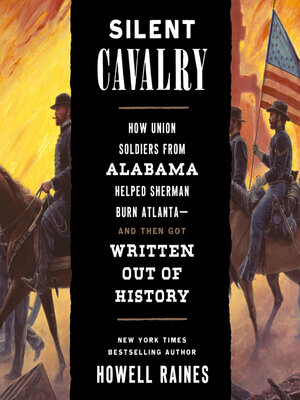Silent Cavalry
audiobook (Unabridged) ∣ How Union Soldiers from Alabama Helped Sherman Burn Atlanta—and Then Got Written Out of History
By Howell Raines

Sign up to save your library
With an OverDrive account, you can save your favorite libraries for at-a-glance information about availability. Find out more about OverDrive accounts.
Find this title in Libby, the library reading app by OverDrive.



Search for a digital library with this title
Title found at these libraries:
| Library Name | Distance |
|---|---|
| Loading... |
A Pulitzer Prize–winning journalist reveals the little-known story of the Union soldiers from Alabama who played a decisive role in the Civil War, and how they were scrubbed from the history books.
“It is my sincere hope that this compelling and submerged history is integrated into our understanding of our nation, and allows us to embrace new heroes of the past.”—Imani Perry, professor, Harvard University, and National Book Award–winning author of South to America
We all know how the Civil War was won: Courageous Yankees triumphed over the South. But is there more to the story?
As Pulitzer Prize–winning journalist Howell Raines shows, it was not only soldiers from northern states who helped General William Tecumseh Sherman burn Atlanta to the ground but also an unsung regiment of 2,066 Alabamian yeoman farmers—including at least one member of Raines’s own family.
Called the First Alabama Cavalry, U.S.A., this regiment of mountain Unionists, which included sixteen formerly enslaved Black men, was the point of the spear that Sherman drove through the heart of the Confederacy. The famed general hailed their skills and courage. So why don’t we know anything about them?
Silent Cavalry is part epic American history, part family saga, and part scholarly detective story. Drawing on the lore of his native Alabama and investigative skills honed by six decades in journalism, Raines brings to light a conspiracy that sought to undermine the accomplishments of these renegade southerners—a key component of the Lost Cause effort to restore glory to white southerners after the war, even at the cost of the truth.
In this important new contribution to our understanding of the Civil War and its legacy, Raines tells the thrilling tale of the formation of the First Alabama while exposing the tangled web of how its wartime accomplishments were silenced, implicating everyone from a former Confederate general to a gaggle of Lost Cause historians in the Ivy League and a sanctimonious former keeper of the Alabama state archives. By reversing the erasure of the First Alabama, Silent Cavalry is a testament to the immense power of historians to destroy as well as to redeem.
“It is my sincere hope that this compelling and submerged history is integrated into our understanding of our nation, and allows us to embrace new heroes of the past.”—Imani Perry, professor, Harvard University, and National Book Award–winning author of South to America
We all know how the Civil War was won: Courageous Yankees triumphed over the South. But is there more to the story?
As Pulitzer Prize–winning journalist Howell Raines shows, it was not only soldiers from northern states who helped General William Tecumseh Sherman burn Atlanta to the ground but also an unsung regiment of 2,066 Alabamian yeoman farmers—including at least one member of Raines’s own family.
Called the First Alabama Cavalry, U.S.A., this regiment of mountain Unionists, which included sixteen formerly enslaved Black men, was the point of the spear that Sherman drove through the heart of the Confederacy. The famed general hailed their skills and courage. So why don’t we know anything about them?
Silent Cavalry is part epic American history, part family saga, and part scholarly detective story. Drawing on the lore of his native Alabama and investigative skills honed by six decades in journalism, Raines brings to light a conspiracy that sought to undermine the accomplishments of these renegade southerners—a key component of the Lost Cause effort to restore glory to white southerners after the war, even at the cost of the truth.
In this important new contribution to our understanding of the Civil War and its legacy, Raines tells the thrilling tale of the formation of the First Alabama while exposing the tangled web of how its wartime accomplishments were silenced, implicating everyone from a former Confederate general to a gaggle of Lost Cause historians in the Ivy League and a sanctimonious former keeper of the Alabama state archives. By reversing the erasure of the First Alabama, Silent Cavalry is a testament to the immense power of historians to destroy as well as to redeem.







